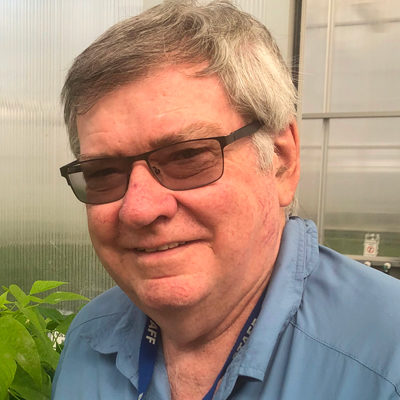
Denis Persley
Regional Winner | Sustainability category
Brisbane, QLD
Denis Persley is an adviser at the Department of Agriculture and Fisheries in Queensland and a 2020 Growth Awards Regional Winner in the Sustainability category. Read on to learn more about Denis.
What’s the one thing you have done in your career you are most proud of?
It has been rewarding to work closely with industry and provide some decent solutions for some of their problems in terms of management of their vegetable crops. I’ve been proud of my work to find and then develop virus resistant vegetable varieties in crops such as zucchini, capsicums and tomatoes. This work has certainly lessened the need for chemicals and provides a durable resistance to disease with little added cost to the grower. It also gives them greater confidence that they will be able to get a crop through to harvest, even if there is serious disease in the area. In turn, they have a more resilient business and more certainty of growing a crop if they know the chances of it being badly affected by disease are fewer. One particular example was in capsicum, where my colleagues and I identified the original source of disease in capsicums, looked at genetics of it and then partnered with Syngenta to incorporate that resistance into capsicum hybrids. Some of the other work I’m also proud of is evaluating material that is reported to be resistant and review it under Australian conditions with the pressure of Australian strains to see how well it fits into our farming systems.
How will you share what you learn with others in the industry?
Seminars and visits are a great way to share information. Meeting up with growers and other agronomists at local events is another good way to tailor what you’ve learnt to a specific audience. I can talk about the crops they grow, and then we can talk about where the future lies in terms of disease resistance. Targeted communications through trade magazines are good, provided you know who your audience is and you write to them rather than write something that is very general and doesn’t really give the in-depth information they are looking for.
What do you see as your biggest opportunity in the next 12 months?
There are several things I’m working on now in terms of virus resistance that I would like to see through. This includes work on zucchini and bean varieties and resistance to virus. The most exciting opportunity is work I am doing in conjunction with the University of Queensland and a commercial company to develop a new system of virus management. It’s a novel method which uses viral genes to immunise the plant against infection. That work is at an early stage, but if it is successful in the next 12 months, then it will be a great leap forward in how we can correctly manage virus diseases in crops. The system uses a partial virus sequence, which is then inserted into a micro clay particle which surrounds it and then it can be sprayed on plants like a pesticide. When the micro clay breaks down, it releases the viral sequence that then prevents infection by the virus even if it is brought in by insect vectors. It is a revolutionary way of providing protection against viral diseases, with many of the finer details still commercial in confidence.
What is the biggest barrier to achieving success in the next 12 months?
There are many steps between a concept and a commercial product and that could mean any success within a 12-month time frame could be limited if those steps take longer than hoped. What we must do in every development phase is move beyond proof of concept. We are at that stage now with several resistance lines and are looking at ways to guarantee results are consistent and can be applied to developing a commercial product which can then be used in the field. We need to show it works almost all the time against target pathogens. You can find a resistance line in a big germplasm collection but it’s a huge step from getting that resistance into varieties which are commercially acceptable. Quite often you get a line which has good resistance but economically it might not perform as a variety commercially. It is a big step to get it where it can compete in the open marketplace with other varieties and industry can use it with confidence.
What is the biggest challenge Australian Ag has to overcome in the next 10 years?
We need to understand how to handle the variability in climate and make the best use of that changing environment. It’s not just talking about or accepting there is climate change because we have evidence of that. We need to understand how climate change impacts agriculture. This includes not only the way crops grow, but incidence of diseases and insect pests. It is important to develop better ways of handling pests and diseases, reducing our reliance on pesticides and looking for alternatives to be able to use things strategically. We produce a large amount and range of fruit and vegetables and developing more export markets would allow us to make the best use of the ideal climate we have here to produce a range of products.